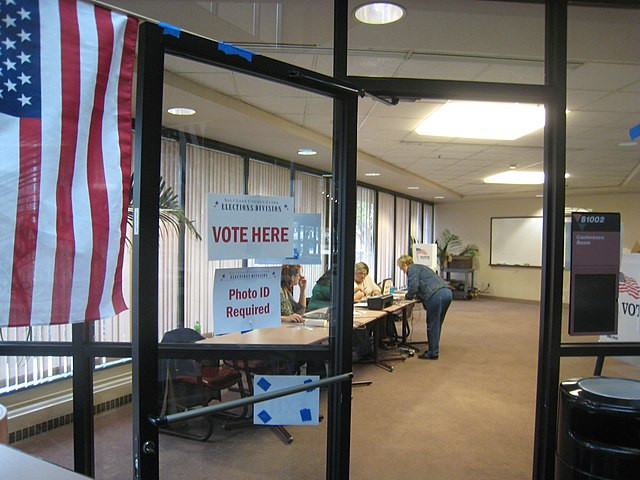Bomb threats targeting multiple polling locations in battleground states caused disruptions and evacuations on Election Day, with the FBI linking many of the hoaxes to Russian email domains. In a statement on Tuesday, the FBI said that "election integrity is among the FBI's highest priorities," as it confirmed that threats in states such as Georgia, Arizona, Michigan, Wisconsin, and Pennsylvania were "non-credible" but nevertheless required immediate action from authorities.
In metro Atlanta, Georgia, where voting at more than a dozen sites was briefly interrupted, authorities reported several bomb threats in highly populated Democratic areas, including Fulton and DeKalb counties. In response, a judge ruled that some polling stations would remain open past the 7 p.m. deadline. Georgia Secretary of State Brad Raffensperger condemned the incidents, blaming Russia for "sowing discord" among Americans. "They don't want us to have a smooth, fair, and accurate election," he said. "If they can get us to fight among ourselves, they can count that as a victory."
The Russian Embassy in Washington quickly dismissed the allegations as "malicious slander," releasing a statement that emphasized, "Russia has not interfered and does not interfere in the internal affairs of other countries, including the United States. As President Vladimir Putin has repeatedly stressed, we respect the will of the American people." This denial follows years of heightened scrutiny surrounding Russian interference in U.S. elections, notably in 2016, where 12 Russian intelligence officers were later indicted for election-related cyber operations.
Georgia experienced over two dozen threats in the Atlanta area alone, where polling sites were temporarily shut down for safety checks before reopening. In addition, threats targeted polling stations in the state capital of Madison, Wisconsin, as well as sites in Michigan and Arizona. Jocelyn Benson, Michigan's Secretary of State, noted that the threats were reported but ultimately deemed non-credible, and polling operations continued.
Adrian Fontes, Arizona's Secretary of State, voiced frustration at what he described as Russia's meddling, adding that he believes Vladimir Putin's actions are designed to "disrupt and intimidate voters." Bomb threats in Arizona targeted four polling stations in Navajo County, a region with a significant Native American population. Arizona's law enforcement authorities worked quickly to assess the threats, finding no evidence of actual explosives.
In Philadelphia, authorities also responded to bomb threats, which forced a brief halt in voting activities. Philadelphia District Attorney Larry Krasner acknowledged that the FBI was investigating potential Russian links to the threats but did not confirm a direct connection. Pennsylvania Governor Josh Shapiro also confirmed multiple reports of threats, although none were ultimately substantiated.
The scare tactics come amid one of the tightest presidential elections in recent history, with Democratic Vice President Kamala Harris and former President Donald Trump locked in a contentious battle for the White House. Election interference allegations have loomed large throughout the campaign season, with U.S. intelligence agencies repeatedly warning of attempts by foreign actors to undermine public trust in the democratic process.
The pattern of threats appeared to mirror prior instances of foreign interference, including a video released earlier this month, which falsely depicted non-U.S. citizens casting ballots in Georgia. Intelligence officials attributed the footage to Russian operatives, warning that it was part of a larger disinformation effort to disrupt U.S. elections.
Across social media, pro-democracy groups and civil rights organizations voiced concerns about the bomb threats' potential to dissuade voters. Derrick Johnson, president of the NAACP, urged voters in targeted areas not to be deterred, saying, "The right to vote is sacred. No individual or foreign entity should be able to undermine the voices of Black Georgians."
A senior official in Raffensperger's office, who spoke on condition of anonymity, stated that the emails containing threats matched previous email addresses linked to Russian attempts at interference in U.S. elections. "It's a likelihood it's Russia," the official remarked, emphasizing that the incidents fit a pattern seen in recent election cycles.
Although the FBI stated it was closely monitoring the situation, Cait Conley from the U.S. Cybersecurity and Infrastructure Security Agency noted that her agency had not observed any significant disruptions to election infrastructure. "At this point, we are not currently tracking any national level significant incidents impacting the security of our election infrastructure," she told reporters.
While local and federal officials continue to monitor potential threats, the recent bomb scares underscore the enduring challenges the U.S. faces in safeguarding its elections from foreign interference. The attacks have reinvigorated debates over election security and the need for robust measures to protect democratic institutions from cyber and psychological warfare.






